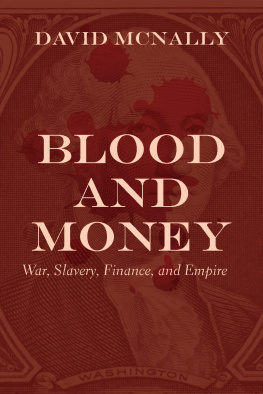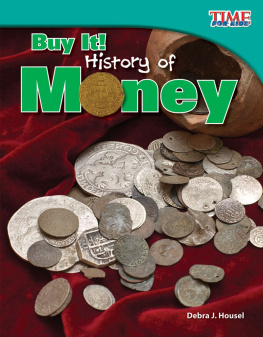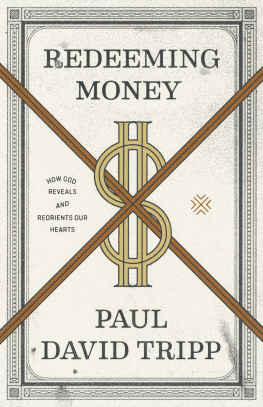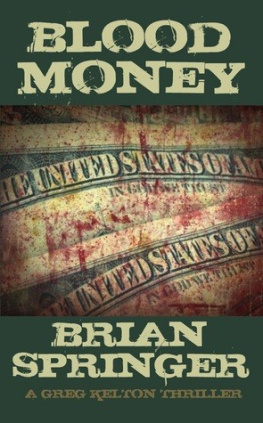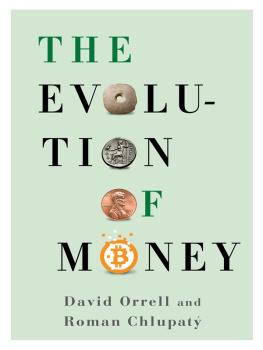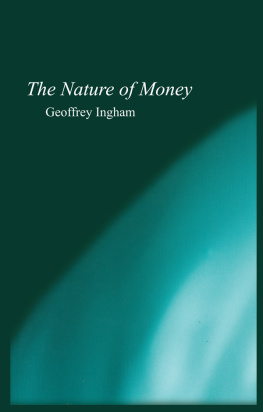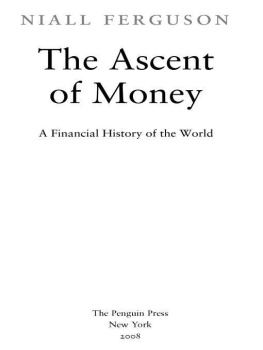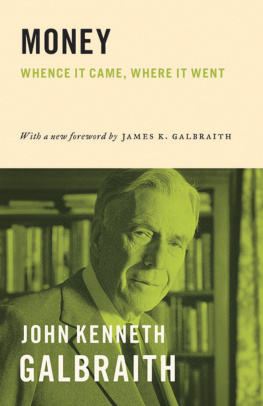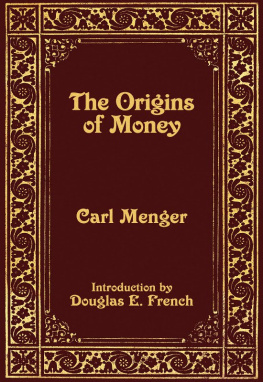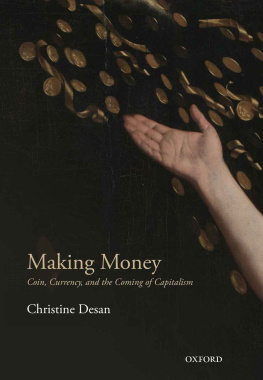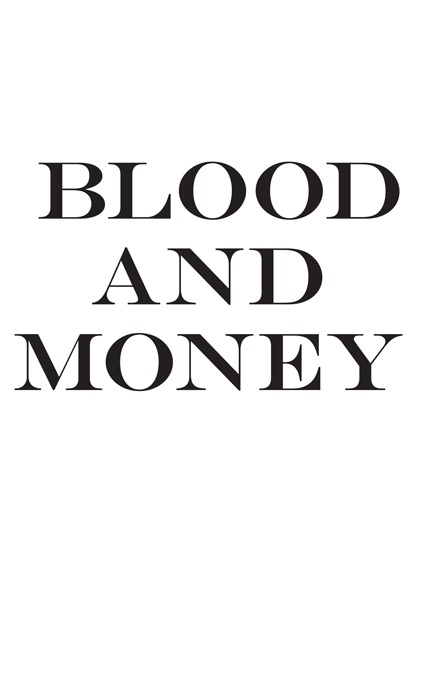
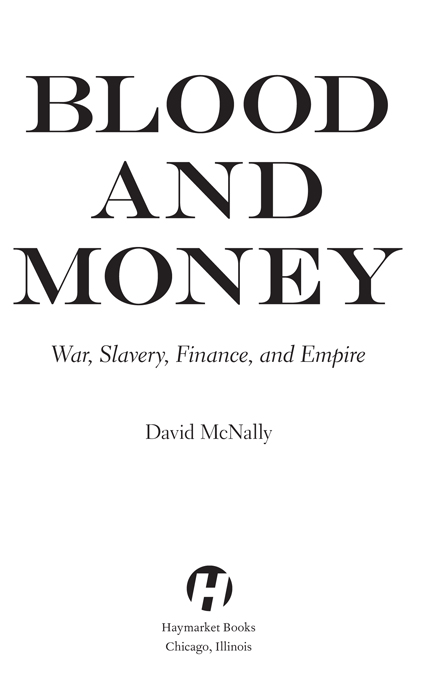
2020 David McNally
Published in 2020 by
Haymarket Books
P.O. Box 180165
Chicago, IL 60618
773-583-7884
www.haymarketbooks.org
ISBN: 978-1-64259-206-1
Distributed to the trade in the US through Consortium Book Sales and Distribution (www.cbsd.com) and internationally through Ingram Publisher Services International (www.ingramcontent.com).
This book was published with the generous support of Lannan Foundation and Wallace Action Fund.
Special discounts are available for bulk purchases by organizations and institutions. Please call 773-583-7884 or email for more information.
Cover design by Rachel Cohen.
Library of Congress Cataloging-in-Publication data is available.

For Helen, John, and Marilyn
And in memory of Colin Barker, Joyce and Ken Ferguson,
and Ellen Meiksins Wood
Foreword and Acknowledgments
This book has been many years in the making. It originated in efforts to make sense of world money as a critical concept for the understanding of modern capitalism. As so often happens, this interest coincided with othersincluding the questions of slavery and the rise of capitalismin ways that took me down unanticipated paths. Eventually, I found myself toiling at the crossroads of money and slavery in the ancient Greco-Roman world. And from there, I kept crossing historys bridges to later historical complexes of war, slavery, finance, and empirefrom early modern Britain to the US empire today. The result, I hope, is a unique historical interpretation of money and power in the making of our world.
The first presentation of some of these arguments came in my Deutscher Memorial Prize Lecture at the 2013 Historical Materialism Conference at the University of London. A revised version of that lecture appeared the next year as The Blood of the Commonwealth: War, the State and the Making of World-Money, in Historical Materialism (vol. 22, no. 2). I thank the journals editors and the conference organizers for their support.
As work on the book proceeded, I benefited from insightful feedback on several chapters from Colin Barker, Sue Ferguson, Holly Lewis, Geoff McCormack, and Colin Mooers. I extend my warmest thanks and appreciation to all of them. I especially remember, with sadness and great affection, the encouragement I received from Colin Barker, who expressed great excitement about this project and insisted on reading some of its chapters while battling the cancer that took him from us. Colin was a true friend, a wonderful, generous socialist, and an incisive radical thinker.
Work on this book was regularly halted as we lost others along the way. My loving partner, Sue Ferguson, lost both of her parents, Joyce and Ken, in 2016 and 2017, respectively. They are remembered with love and affection.
My dear friend and former teacher Ellen Meiksins Wood passed in 2016. Outside of asking Ellen one small question concerning my research on ancient Greece, I did not have the benefit of her sharp and discerning opinions on the arguments I have made here. Ellen might have differed with me on many points in the analysis that follows. But she would have been pleased, I think, that I have honored her injunction to always do the necessary historical investigation before pronouncing oneself on matters like these.
While I was working on this book, I moved from Torontos York University to the University of Houston. Big thanks are due to my colleagues and students at York, where I first launched this project. My warm reception in the Department of History in Houston has been a true joy, for which I am grateful to all my colleagues there. For their kindness, generosity, and support, special thanks are due to Donna Butler, Philip Howard, Tom OBrien, Raul Ramos, Linda Reed, Paul Scott, Abdel Razzaq Takriti, and Cihan Yksel Muslu. Their support has meant the world to me as I make a new home in Houston. I am truly thrilled that Blood and Money will roll off the presses as my first book as a member of the UH Department of History.
I also want to recognize the inspiring activists of the Convict Leasing and Labor Project (CLLP) in Sugar Land, Texas, with whom I have been privileged to work since my arrival in Houston. I will say something more about them in my next book, which will be devoted to the relationship between slavery and capitalism. That question forms much of the backdrop to their efforts to preserve and memorialize the remains of ninety-five African American convict laborers found in 2018 at the site of the former Imperial Prison Farm in Sugar Land. I particularly want to acknowledge the decades of work in this area by CLLP founder Reginald Moore, the keeper of the flame, and to recognize the dedication to this cause of Sam Collins, Barbara Jones, Naomi Carrier Mitchell, and Liz Austin Peterson.
At the heart of my life is the love and support of Sue Ferguson and of our amazing children, Adam, Sam, and Liam. Once again, Sue has been with me on this journey every step of the way, while toiling away at a book of her own. As pleased as I am to be sending Blood and Money to Haymarket Books, I truly cannot wait for Sues book launch. As for our boys, they continue to be endless sources of joy, love, laughter, and celebration. I thank them and hug them all.
In this day and age especially, authors ought to be immensely appreciative to editors and publishers dedicated to the process of writing and producing high-quality books. I cannot say enough about the wonderful folks at Haymarket Books. I particularly want to thank John McDonald and Anthony Arnove for their support and encouragement, my manuscript editor, Ashley Smith, for his valuable and insightful comments, and copy editor, Sam Smith, for their meticulous attention to the manuscript.
I am extremely fortunate to have my parents with me at this stage of my life. All of them have dealt with health challenges in recent years, yet each has managed to keep moving forward with good humor and love for the people in their lives. My mother, Helen, continues to amaze with the support she gives to beleaguered souls, and with her love for all of us. My father, John, endlessly warms my heart with the abiding interest he takes in my writing and my social justice commitments, and in the accomplishments of his grandchildren. Marilyn McNally came into my life, and those of my sisters, when I was a teenager. Her love and support for me, and for my siblings, Terri, Sandra, and Steven, has meant the world to all of us.
I dedicate this book to these three eldersHelen, John, and Marilyn. I further dedicate it to the memories of Joyce and Ken Ferguson, Colin Barker, and Ellen Meiksins Wood. They have passed on, but in our hearts they remain.
Introduction
It is remarkable how deferential people can be, even progressive people, when it comes to the subject of money. In a recent critical work debunking mainstream economics, for instance, the author instructs us that monetary and financial systems are among human societys greatest cultural and economic achievements. Turning to the Bank of England, the same author confidently proclaims it to have been a great civilizational advance.
Critical theory insists that objects are not separable from their histories. Every object is defined by the process of its emergence and development. Rather than mere externalities, these processes are intrinsic to objects themselves. Where money is concerned, I submit that every layer of its sedimentation is mingled with the blood of slaves, of soldiers, of the colonized, of the exploited and oppressed. Notwithstanding the considerable differences between monetary regimes throughout history, these features have been at the core of each. And they are histories that must be ruptured if violence and domination are to be overcome.
Next page
